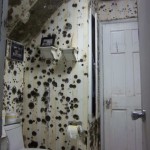Georgia Lightning Awareness Week: June 19-25, 2011
 Tuesday, May 17, 2011 at 04:17PM
Tuesday, May 17, 2011 at 04:17PM 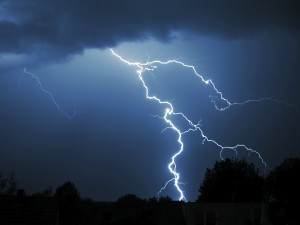 Lightning is one of the leading causes of weather deaths in the United States. From 1995 to 2010, lightning caused 26 deaths in Georgia. Most lightning deaths occur in the summer months - usually in the afternoon and evening hours. Also, most deaths occur when people are caught outside during a storm.
Lightning is one of the leading causes of weather deaths in the United States. From 1995 to 2010, lightning caused 26 deaths in Georgia. Most lightning deaths occur in the summer months - usually in the afternoon and evening hours. Also, most deaths occur when people are caught outside during a storm.
Lightning results from the buildup and release of electrical energy between positive and negative charges between the earth and a thunderstorm. A single lightning bolt can be as hot as 50,000 degrees Fahrenheit - hotter even than the surface of the sun. This rapid heating and cooling of the air creates a shock wave which we hear as thunder. Lightning will usually strike the highest object in area. This includes trees, antennas, a boat on a lake, or a person standing in a field.
So, what should you do to protect yourself?
 Champion Construction Systems,
Champion Construction Systems,  Community News,
Community News,  Current Events,
Current Events,  Education,
Education,  Emergency Planning,
Emergency Planning,  Fire Damage,
Fire Damage,  Georgia,
Georgia,  Insurance,
Insurance,  Storm Damage,
Storm Damage,  Water Damage,
Water Damage,  atlanta,
atlanta,  atlanta ga,
atlanta ga,  champion construction,
champion construction,  disaster planning,
disaster planning,  disaster preparedness,
disaster preparedness,  georgia lightning awareness,
georgia lightning awareness,  georgia lightning awareness week,
georgia lightning awareness week,  lightning safety,
lightning safety,  lightning safety tips,
lightning safety tips,  newnan ga,
newnan ga,  north atlanta,
north atlanta,  sharpsburg
sharpsburg  Email Article
Email Article VACATION CHECKLIST: Things To Do Before You Leave
 Tuesday, May 17, 2011 at 03:43PM
Tuesday, May 17, 2011 at 03:43PM  It's summertime and that means vacations for most families. Unfortunately, your vacation buzz can be lost too quickly when you get home and realize that you forgot to take care of a few essentials. Your vacation should be an enjoyable and relaxing time, so before you head out here are a few things to be sure to check off your list so that you can come back to your home in the safe condition you left it.
It's summertime and that means vacations for most families. Unfortunately, your vacation buzz can be lost too quickly when you get home and realize that you forgot to take care of a few essentials. Your vacation should be an enjoyable and relaxing time, so before you head out here are a few things to be sure to check off your list so that you can come back to your home in the safe condition you left it.
-
Hold mail and newspapers.
-
Pay bills that will be due while gone.
-
Make arrangements for a neighbor or friend to have a key to your house or apartment - or at least know where one is. Give them a number where you can be reached.
-
Hold mail and newspapers.
-
Hurricane Season Predictions 2011
 Tuesday, May 17, 2011 at 02:59PM
Tuesday, May 17, 2011 at 02:59PM  Have you prepared an emergency plan for your family in case a natural disaster strikes your area. It's a fact that weather related disasters are on an increase in this country and throughout the world. The following is the current forecast for the upcoming hurricane season.
Have you prepared an emergency plan for your family in case a natural disaster strikes your area. It's a fact that weather related disasters are on an increase in this country and throughout the world. The following is the current forecast for the upcoming hurricane season.
Weather forecasting teams are predicting an active hurricane season for 2011, calling for an above-average number of storms to form in the Atlantic Hurricane Basin.
Earth Networks’ WeatherBug meteorology team foresees a lower number of expected hurricanes in comparison to 2010, but its numbers are still trending above what is considered to be a normal tropical storm season.
Specifically, Earth Networks expects a total of 13-14 named storms to form, with 7-8 becoming hurricanes. Of those, it expects four will become strong enough to be classified at “intense” storms—Category 3 or higher on the Saffir-Simpson scale.
 Champion Construction Systems,
Champion Construction Systems,  Community News,
Community News,  Current Events,
Current Events,  Emergency Planning,
Emergency Planning,  Gary Anderson,
Gary Anderson,  Storm Damage,
Storm Damage,  Water Damage,
Water Damage,  atlanta,
atlanta,  atlanta ga,
atlanta ga,  champion construction,
champion construction,  hurricane season,
hurricane season,  hurricane season 2011,
hurricane season 2011,  hurricane season predictions,
hurricane season predictions,  hurricanes 2011,
hurricanes 2011,  newnan ga,
newnan ga,  north atlanta,
north atlanta,  sharpsburg,
sharpsburg,  weather predictions 2011
weather predictions 2011  Email Article
Email Article Metro Atlanta Events for June 2011
 Tuesday, May 17, 2011 at 12:11PM
Tuesday, May 17, 2011 at 12:11PM June 3rd - 5th:
Spamalot at the Fox Theatre Atlanta
June 4th:
Miranda Lambert at Verizon Wireless Amphitheatre at Encore Park in Alpharetta
June 4th - August 12th:
Flying High Circus at Callaway Gardens in Pine Mountain
June 7th:
Katy Perry at The Arena At Gwinnett Center in Duluth
June 12th:
Willie Nelson's Country Throwdown Tour at Coolray Field in Lawrenceville
June 15th - 19th:
The Color Purple at the Fox Theatre in Atlanta
June 17th:
Adele at The Tabernacle in Atlanta
June 18th:
Def Leppard with very special guest Heart at Aaron's Amphitheatre at Lakewood in Atlanta
June 24th:
Steve Miller Band at Chastain Park Amphitheatre in Atlanta
 Champion,
Champion,  Champion Construction Systems,
Champion Construction Systems,  Community News,
Community News,  Current Events,
Current Events,  Metro Atlanta Events,
Metro Atlanta Events,  Water Damage,
Water Damage,  adele,
adele,  atlanta,
atlanta,  atlanta events,
atlanta events,  atlanta events june 2011,
atlanta events june 2011,  atlanta ga,
atlanta ga,  champion construction,
champion construction,  community,
community,  def leopard,
def leopard,  def leppard,
def leppard,  katy perry,
katy perry,  miranda lambert,
miranda lambert,  newnan ga,
newnan ga,  north atlanta,
north atlanta,  sharpsburg,
sharpsburg,  spamalot,
spamalot,  steve miller band,
steve miller band,  the color purple,
the color purple,  willie nelson
willie nelson  Email Article
Email Article Champion Is Now A Member of Certified Restoration Team!
 Monday, May 16, 2011 at 12:24PM
Monday, May 16, 2011 at 12:24PM 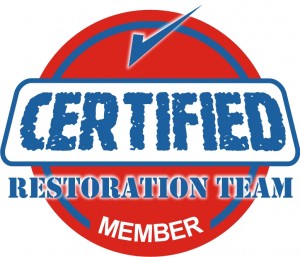 Champion is excited to announce that we are now a member of Certified Restoration Team!
Champion is excited to announce that we are now a member of Certified Restoration Team!
What Is Certified Restoration Team?
Certified Restoration Team is a group of contractors that have all been certified to properly restore properties after a water or fire loss. Did you know that the vast majority of restoration contractors have never been certified and perform substandard work in homes and businesses around the country? Unfortunately those property owners don’t realize until too late that they have gotten poor quality service. This can lead to on-going damage, mold growth, bacterial amplification and a generally unhealthy structure.
You can do a lot to prevent these problems by hiring a certified firm. All of the firms that are a part of Certified Restoration Team must prove their credentials and maintain their certification through Continuing Education. You can choose a Certified Restoration Team member with confidence because they have the knowhow to fix your property right.
No Certified Restoration Team member pays to be a part of the team and they don’t pay for referrals. We work cooperatively for the advancement of our industry and the betterment of our customers. Please support our efforts by recommending CRT to your insurance agent or adjuster.
Be Hurricane Ready This Spring
 Thursday, April 21, 2011 at 11:15AM
Thursday, April 21, 2011 at 11:15AM 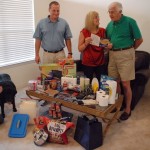 Hurricanes in Georgia? Yes! According to the National Oceanic and Atmospheric Administration (NOAA) Georgia is at particular risk of being affected by hurricanes because it is a coastal state. The hurricanes that affect Georgia are severe tropical storms that form in the southern Atlantic Ocean, Caribbean Sea and Gulf of Mexico. Hurricane season lasts from June 1st until November 30th, but the majority of activity is from August until October. Therefore, every state resident and business owner should plan what to do in the event of a hurricane or tropical storm. The following tips can help you keep you and your family safe this hurricane season.
Hurricanes in Georgia? Yes! According to the National Oceanic and Atmospheric Administration (NOAA) Georgia is at particular risk of being affected by hurricanes because it is a coastal state. The hurricanes that affect Georgia are severe tropical storms that form in the southern Atlantic Ocean, Caribbean Sea and Gulf of Mexico. Hurricane season lasts from June 1st until November 30th, but the majority of activity is from August until October. Therefore, every state resident and business owner should plan what to do in the event of a hurricane or tropical storm. The following tips can help you keep you and your family safe this hurricane season.
Preparing for a Hurricane
 Champion Construction Systems,
Champion Construction Systems,  Georgia,
Georgia,  Uncategorized,
Uncategorized,  Water Damage,
Water Damage,  atlanta,
atlanta,  atlanta ga,
atlanta ga,  champion construction,
champion construction,  disaster,
disaster,  disaster planning,
disaster planning,  disaster preparedness,
disaster preparedness,  georgia hurricanes,
georgia hurricanes,  hurricane preparedness,
hurricane preparedness,  hurricane safety,
hurricane safety,  hurricane tips,
hurricane tips,  hurricanes in georgia,
hurricanes in georgia,  newnan ga,
newnan ga,  north atlanta,
north atlanta,  sharpsburg
sharpsburg  Email Article
Email Article Be Flood Ready This Spring!
 Tuesday, March 22, 2011 at 03:43PM
Tuesday, March 22, 2011 at 03:43PM 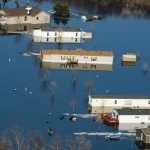 Here are some basic steps to take to prepare for spring rains:
Here are some basic steps to take to prepare for spring rains:
- Contact the local county geologist or county planning department to find out if your business is located in a flash-flood-prone area or landslide-prone area.
- Learn about your community's emergency plans, warning signals, evacuation routes, and locations of emergency shelters.
- Plan and practice a flood evacuation route with your employees. Post emergency phone numbers at every phone.
How Do I Know If I Have Hidden Mold?
 Monday, March 21, 2011 at 11:42AM
Monday, March 21, 2011 at 11:42AM Suspicion of hidden mold:
You may suspect hidden mold if a building smells moldy, but you cannot see the source, or if you know there has been water damage and residents are reporting health problems. Mold may be hidden in places such as the back side of dry wall, wallpaper, or paneling, the top side of ceiling tiles, the underside of carpets and pads, etc. Other possible locations of hidden mold include areas inside walls around pipes (with leaking or condensing pipes), the surface of walls behind furniture (where condensation forms), inside ductwork, and in roof materials above ceiling tiles (due to roof leaks or insufficient insulation).
Investigating hidden mold problems
Investigating hidden mold problems may be difficult and will require caution when the investigation involves disturbing potential sites of mold growth. For example, removal of wallpaper can lead to a massive release of spores if there is mold growing on the underside of the paper. If you believe that you may have a hidden mold problem, consider hiring an experienced professional.
Cleanup and Biocides
 Champion Construction Systems,
Champion Construction Systems,  Commercial Property,
Commercial Property,  Community News,
Community News,  Current Events,
Current Events,  Flood Damage,
Flood Damage,  Restoration,
Restoration,  Water Damage,
Water Damage,  atlanta,
atlanta,  atlanta ga,
atlanta ga,  champion construction,
champion construction,  disaster preparedness,
disaster preparedness,  hidden mold,
hidden mold,  how do i know if i have mold,
how do i know if i have mold,  how to clean mold,
how to clean mold,  is mold dangerous,
is mold dangerous,  mold,
mold,  mold cleanup,
mold cleanup,  mold from water damage,
mold from water damage,  mold in home,
mold in home,  mold inspection,
mold inspection,  sharpsburg,
sharpsburg,  toxic mold,
toxic mold,  water
water  Email Article
Email Article Gas Saving Tips
 Tuesday, March 15, 2011 at 09:28AM
Tuesday, March 15, 2011 at 09:28AM  Champion,
Champion,  Champion Construction Systems,
Champion Construction Systems,  Community News,
Community News,  Community Service,
Community Service,  Current Events,
Current Events,  Water Damage,
Water Damage,  atlanta,
atlanta,  atlanta ga,
atlanta ga,  champion construction,
champion construction,  customer service,
customer service,  disaster planning,
disaster planning,  gas prices,
gas prices,  gas saving tips,
gas saving tips,  georgia gas,
georgia gas,  georgia gas prices,
georgia gas prices,  how to save gas,
how to save gas,  how to save money on gas,
how to save money on gas,  katrina barish,
katrina barish,  sharpsburg
sharpsburg  Email Article
Email Article Mold, Moisture, and Your Home
 Thursday, February 24, 2011 at 03:32PM
Thursday, February 24, 2011 at 03:32PM - When water leaks or spills occur indoors - ACT QUICKLY. If wet or damp materials or areas are dried 24-48 hours after a leak or spill happens, in most cases mold will not grow.
- Clean and repair roof gutters regularly.


